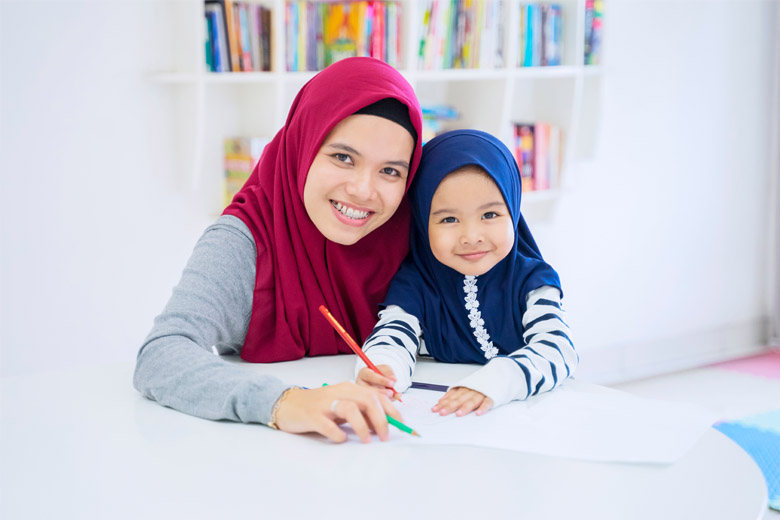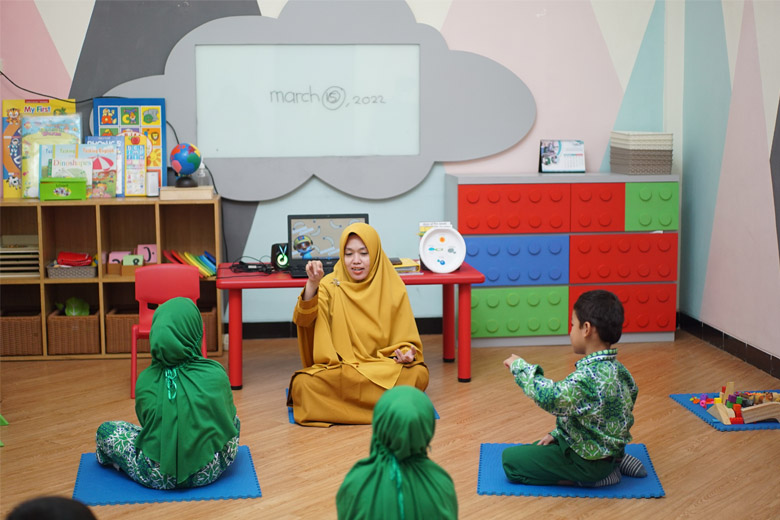Education in the United Arab Emirates (UAE) is designed to serve cultural values, and it all begins in kindergarten, with the core elements of Emirati culture being delivered in the Early Childhood Education (ECE) curriculum.
Islamic Studies is an integral part of the Emirati kindergarten curriculum, with the main Islamic virtues of gratitude and compassion actively emphasised. Similarly, via social studies, children learn about Emirati heritage and culture by immersing themselves in authentic stories about their own lives, families and communities in order to foster national awareness.
The UAE’s ongoing efforts to achieve a world-class standard of education by establishing a first-rate system has necessitated a total restructuring of the education system and teaching methodologies. Within this vision, culture and religion are given a high level of importance, with the government stating that one of its goals is to promote an inclusive environment that integrates all segments of society while preserving the UAE’s unique culture, heritage, and traditions while reinforcing social and family cohesion.

Improvements in curriculum design and teacher education have risen enormously
These strands can be linked together through the country’s educational system, which aspires to develop engaged participants in the nation’s future.
The Hidden Curriculum
Improvements in curriculum design and teacher education have risen enormously, and the emphasis has turned to the establishment of long-term aspirational goals consistent with the nation’s vision. These objectives do not undermine culture, but rather bring culture and curriculum to the forefront, with the goal of developing the curriculum while incorporating local culture.
The curriculum, which is an umbrella under which the educational experiences offered to a learner fall, is a major and defining component of any educational system. It includes not only the formal curriculum but also the ‘informal’ curriculum of so-called extracurricular activities, as well as all of the characteristics that contribute to the school’s ‘ethos,’ such as the quality of relationships, concern for equality of opportunity, and the values exemplified in the way the school approaches its task and is organised and managed.

Culture influences how youngsters play
Despite the fact that this is an older definition, it is nevertheless used in the UAE’s modern schools. First and foremost, culture can be viewed as the source of the ‘hidden curriculum,’ or experiences associated with learning that are not directly articulated in the curriculum description. It has also been demonstrated that culture influences how youngsters play. Bruner emphasises the cultural-psychological perspective on education in his book The Culture of Education. He highlights the importance of considering education within the context in which it is situated. Culture helps people make sense of their surroundings and can act as a lens through which knowledge is viewed.
For that reason, all knowledge is filtered through an individual’s culture before a full understanding is reached. Moreover, numerous academics have observed that culture is an essential element in teaching a second language, which is another important factor that has contributed to ECE within the UAE.

Numerous academics have observed that culture is an essential element in teaching a second language
ECE is Critical
Culture is the theme that society uses to express its essential characteristics and values, as well as its tangible and intangible potential. Thus, culture represents civilisational worth and everything that it entails in terms of beliefs, ideas, ethics, and attitudes.
As a result, as culture and curriculum interact, children learn to construct their own meanings. According to Pekarsky (1988), the three key variables that determine human moral character are genetics, early childhood experiences and surrounding culture. Our pre-existing morals and values as adults adapt to the surrounding culture by focusing on the third variable, which is the surrounding culture.

The three key variables that determine human moral character are genetics, early childhood experiences and surrounding culture
The importance of development from birth to the age of five is well established in the literature, and advancements during these years in physical development, cognition, language and the social-emotional domain, as well as self-regulation skills, lay the groundwork for later development to adulthood and beyond. A child’s emotional, social, cognitive, language and physical development are influenced by the personal experiences he or she has early in life. Consequently, ECE is critical to every country’s education system, not just for academic accomplishment but also for the entire development of the child.
The UAE’s approach to education will allow its distinct culture to continue and be anchored in progressive and moderate Islamic ideals and endowed with a rich Arabic language, allowing Emiratis to openly enjoy their traditions and heritage while strengthening their national identity.
















